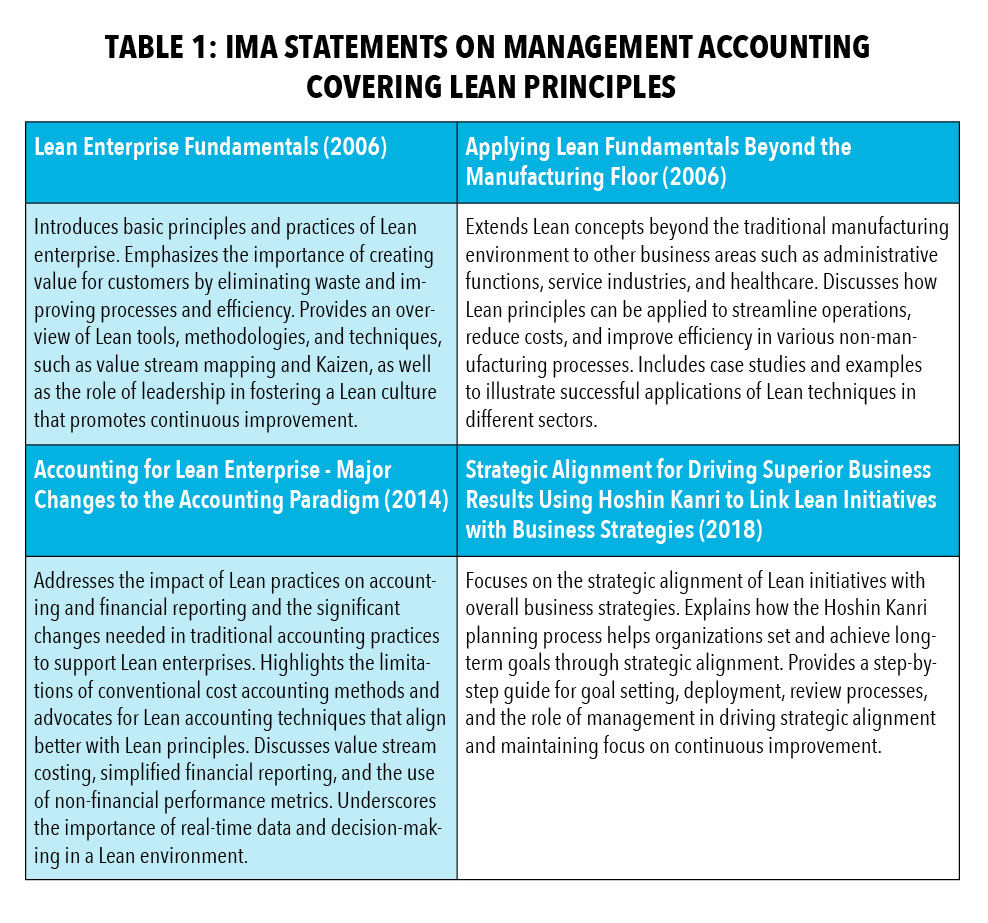Educators are always looking for ways to make management accounting courses more relevant and engaging. And there’s a critical need to integrate current business trends and cultivate students’ business acumen.
So why not inject a real-world dose of Lean principles and strategy into the classroom?
Incorporating Lean concepts into management accounting education introduces students to an essential way of thinking in the business world. It also helps to demystify Lean for future generations of accounting and finance professionals.
But before we explain what Lean learning should look like for educators, let’s explore why Lean has become mission-critical in today’s work environment.
Why Do We Need to Teach Lean?
Lean has become an organization-wide strategy that’s evolved dramatically from its 18th-century manufacturing origins. Lean principles arose out of Eli Whitney’s production innovation of using interchangeable parts, and were later integrated into the Toyota Production System, a book about which coined the term “lean.” Today, Lean strategy is about improving processes and eliminating waste so businesses can better serve customers as a way to maximize value. Organizations worldwide continue to embrace Lean practices. Lean adoption has spread from automotive manufacturing companies to aerospace, hospitals, medical device manufacturers, process industries and services, and beyond. For example, hospitals and healthcare organizations use it to improve patient outcomes and increase margins. Government agencies implement it to enhance operational efficiency and service delivery. And tech giants employ Lean practices to maintain a competitive edge in their fast-paced sector.
Implementing Lean also helps companies streamline production processes and enhance quality. For example, after applying Lean practices, logistics giant FedEx was able to double maintenance work of its airplanes and the number of maintenance checks performed. Meanwhile, Amazon used Lean principles in logistics and supply-chain management to drive efficiency and customer satisfaction in the e-commerce sector.
Lean isn’t just about cutting costs or reducing headcounts. It’s also designed to boost value by improving product quality and reducing inefficiency.
Lean is characterized by five core principles:
- Defining value and identifying the value stream for each product or service
- Creating continuous flow
- Establishing pull systems
- Eliminating waste
- Empowering employees to manage processes rather than people
To amplify these principles, support functions must participate—and that includes accounting professionals. In the context of finance, Lean is often separated into the categories “accounting for Lean” and “Lean accounting.” Accounting for Lean develops accurate, timely, and understandable accounting information and processes to support Lean organizations. It ensures that accounting practices align with the Lean production of goods and services. Alternatively, Lean accounting applies Lean concepts and tools to the accounting function.
As organizations worldwide continue to embrace Lean practices, accounting education needs to equip students with the right skills for success in an evolving workplace. And that takes time, as educators need to gain a deeper understanding of Lean and find appropriate materials to teach those skills.
We encourage educators to rethink their curricula to be relevant to their customers and prepare students for their future careers. Accountants play an integral role in supporting the implementation of Lean strategies within organizations. Yet, traditional accounting curricula often fails to incorporate, beyond a few Lean tools, this relevant concept from the business world.
Integrating Lean strategies in management accounting courses can ensure more relevant and actionable content, bridging the gap with practice. This alignment is critical, as we aim to produce accountants who are proficient in technical skills, capable of driving strategic initiatives, and able to contribute to organizational success.
Integrating Lean strategy and principles in the classroom aligns with the IMA Management Accounting Competency Framework (see Figure 1), ensuring that we prepare students to be value-adding professionals by encompassing into our curricula the knowledge, skills, and abilities that accounting and finance professionals need to excel.
And as the accounting profession faces significant challenges—including decreased student enrollment and a growing disinterest in the field—implementing Lean principles can help accelerate a necessary curricular pivot. Testimonials from students introduced to Lean practices emphasize how impactful and effective these practices are, making for more appealing and effective learning experiences to foster a new wave of skilled, adaptable accountants.
Resources for Teaching Lean
Educators need a roadmap to ensure their Lean discussion resonates with students. Fortunately, a range of ideas and resources exist that can spark ideas—whether it’s experiential learning, engaging case studies, or collaborative projects.
Here are some options we recommend:
IMA Statements on Management Accounting: IMA has published several Statements on Management Accounting (SMA) that provide essential guidance on Lean principles within various business processes. Table 1 summarizes four SMAs that are instrumental to understand and implement Lean principles effectively within organizations. These SMAs can guide management accountants and act as a valuable tool for integrating Lean into the classroom.
IMA Articles on Lean: IMA’s Strategic Finance and Management Accounting Quarterly have published many insightful articles on Lean principles that can be searched for on those sites.
Teaching Cases: Show Lean principles in action through case studies, which are a powerful pedagogical tool. They enhance Lean learning by providing students with practical, real-world scenarios to apply theoretical knowledge. Case studies also encourage critical-thinking, problem-solving, and decision-making skills. Through them, students can examine how Lean principles, such as waste reduction, process improvement, and value stream mapping, add value. The IMA Educational Case Journal (IECJ) offers free access to case studies for students. Access to teaching notes is only available to IMA academic members.
Textbooks and Books: Unfortunately, the few accounting textbooks that cover Lean focus only briefly on its tools rather than the practice as a business strategy. Many other books, however, have explored the principles and applications of Lean thinking and how organizations can streamline operations, eliminate waste, and foster a culture of continuous improvement. For instance, Real Numbers: Management Accounting in a Lean Organization by Jean Cunningham and Orest Fiume provides excellent foundational knowledge and practical insights into Lean accounting, emphasizing the transition from traditional accounting practices to those that support Lean principles and practices in organizations. Another more recent example is from 2023: The Lean CFO: Architect of the Lean Management Accounting System. In it, author Nick Katko outlines the CFO’s role in Lean organizations and details how CFOs can lead the development and implementation of Lean management accounting systems that support strategic goals and continuous improvement.
Audio and Video: Podcasts are a powerful tool for bridging the gap between practice and academia. Most importantly, podcasts cover developments that textbooks can’t. They offer practical insights and real-world applications of trending concepts. Podcasts also help educators engage students with emerging ideas and concepts while also helping them develop critical-listening skills. Numerous high-quality podcasts cover Lean concepts. Where to start? IMA’s Count Me In® has tackled Lean on several episodes. Other shows that discuss Lean include the Gemba Academy podcast and the Lean Solutions podcast. We encourage faculty to search these podcasts—and others—to find episodes that focus on Lean topics. In addition to podcasts, there are many YouTube videos created by Lean experts, such as the ones available on Lean Frontiers YouTube channel.
Simulations: Hands-on simulations enable students to apply concepts to a practical scenario and bring them to life to develop a deeper understanding and greater engagement. Simulations enrich the learning experience, making it more interactive and relevant to the professional setting. Many sites offer simulation tools (most of which are free). One place to start: Lean Simulations provides an extensive list of simulations, as well as Lean tools and videos.
Certifications: Some respected organizations oversee certifications and continuing education courses related to Lean accounting, which are available on an individual basis. These can be leveraged by faculty and students interested in obtaining more knowledge of Lean concepts in the accounting context. However, these certifications are not free:
- Lean Frontiers offers a Lean Accounting Knowledge Certification that targets accounting and finance professionals who want to bridge the gap between traditional accounting and Lean management strategy, as well as better support operations.
- BMA’s Lean Management Accounting Certification and Lean Accounting Process Improvement Certification are more comparable to continuing education courses, which come with a completion certificate. The first covers topics including performance measurement, capacity measurement, value stream income statements, and the box score. The second explores Lean thinking for accounting, the daily Lean management system, improving accounts payable and accounts receivable, and improving the month-end close and budgeting.
Accelerating the Lean Learning Curve
Management accounting educators have a responsibility to make their curricula more relevant and engaging for the next generation of professionals. Integrating Lean addresses the growing disinterest in traditional accounting education by offering high-impact learning experiences.
As the accounting profession faces declining enrollment and changing industry demands, rebranding accounting education to include Lean principles can attract more students and better prepare them for successful careers.





